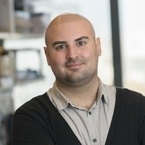
Abstract 658. AKT pathway as a therapeutic target to constrain lineage plasticity leading to histological transdifferentiation.
What are your long-term career objectives?
During my PhD in the Spanish National Cancer Research Center (CNIO) and postdoctoral work at Memorial Sloan Kettering (MSK) I have had the opportunity to be mentored by amazing and supportive physician-scientists, working in a translational and multidisciplinary environment addressing problems from the clinic with scientific questions to be answered in the laboratory. I am extremely fortunate to have had the opportunity to perform my PhD and postdoctoral training with lung cancer research world leaders such as Dr. Luis Paz-Ares and Dr. Charles Rudin, who have provided me all resources required to successfully conduct projects leading to the identification of novel therapeutic targets and to the initiation of clinical trials. Within the next two years, I anticipate applying for independent scientist faculty positions that will allow my future laboratory to focus on lung cancer therapeutics, with the goal of defining more effective treatment approaches to improve and extend the lives of lung cancer patients. This prestigious award would support my career development at a critical transition point toward independence. Attending the AACR conference, the most important cancer research conference is key to presenting my work to the scientific community and establishing opportunities for networking with world leaders in cancer research.
Please share information about how the COVID-19 pandemic has impacted your research over the last two years.
When COVID-19 cases were exploding here in New York in late February 2019 my mother was visiting me. As we were very scared of the situation, which was particularly dramatic in New York City, we decided to go back to Spain after the institution where I work, Memorial Sloan Kettering Cancer Center, decided to shut down its facilities. Soon after, the former president of the United States established the travel ban, which made it impossible for me to come back to New York until August 2019. Even if my mentor Dr. Rudin was completely understanding and did not put any pressure on me during the five months I was stuck in Spain, this time was particularly frustrating and stressful for me, as it was impossible to be present at my workplace and perform any experiments. Luckily, at that time I was working on several projects with a computational biology component, and I was able to make some progress on these by performing analysis of previously generated datasets. And most importantly, I had a lot of help from my amazing lab mates in New York, who were able to perform some experimental procedures for me, which really helped my projects move forward. Even if the pandemic has caused a significant delay in all the projects I was working on, I try to look at the bright side – I had the chance to realize what an amazing mentor and colleagues I have in my laboratory.